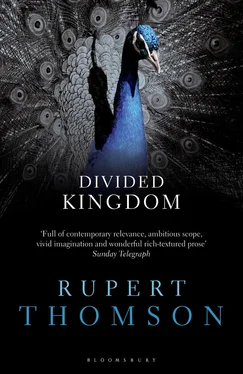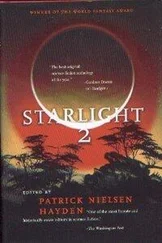Rupert Thomson
Divided Kingdom
To darling Eva, with a love that knows no boundaries
It was as if a curtain had fallen,
hiding everything I had ever known.
— Jean Rhys
There were men in my room, and it was bright, too bright, and I was being lifted out of bed. I didn’t struggle or cry out; I didn’t make a sound. The uniforms they wore felt cold, as if they had just been taken from the fridge.
I was told to wait on the road outside our house. Rain drifted past the street lamp, rain so fine that I could hardly feel it. I watched as a soldier fastened a strip of cloth around my upper arm. My shadow bent where it fell across the kerbstone, like a piece of cardboard folded in two places.
They put me in the back of a lorry, along with people of every age, all of whom wore armbands, none of whom I recognised. No one spoke, or even moved. I remember no violence, only the silence and the constant, weightless rain.
From where I was standing, by the tailgate, I could see my parents. They hadn’t had time to dress properly. My father wore pyjamas, a suit jacket and a pair of slippers, and his face had lines and creases on it, as though sleep had crushed him in its fist. My mother’s feet were bare.
My mother’s feet …
And her blonde hair flattened slightly on one side where it had rested against the pillow. She was calling my name in a high, strained voice, and reaching out to me, her fingers clutching at the air. Embarrassed, I turned away, pretending I didn’t know her. I smiled apologetically at the people all around me.
‘I’m sorry,’ I said.
That’s how my memory begins.
No, not my memory. My life.
When dawn came, I was standing on a railway platform. The sky had clouded over, a swirl of white and grey above the rooftops, and there were puddles everywhere. A goods train rumbled through the station without stopping, its trucks heaped with coils of barbed wire. I was handed tea in a plastic cup and a slice of bread that was thinly spread with margarine. Now it had got light, I could see that the cloth band round my upper arm was red. I didn’t feel homesick, only cold and tired, and I seemed to understand that I shouldn’t think too deeply, as someone who swims in a river might stay close to the bank for fear of treacherous currents.
That same day, after a journey of many hours, we arrived at a large, dilapidated house in the country. There were only eight of us left by then, all boys. Thorpe Hall crouched in a depression in the land, a kind of shallow, marshy bowl, and the property was surrounded by woods, the massed oaks and chestnuts flecked with silver birches, like a head of hair beginning to turn grey. A moat encircled the house on three sides, the surface of the water cloaked in slime, the banks fenced off by reeds. Ancient, stately fish glided through the stagnant depths, the gold of their scales spotted and stained, as if with ink. The lack of elevation and the narrow lead-paned windows gave the house a prying yet shortsighted look. I had the feeling it was aware of me. If I ever ran away, it would somehow know that I had gone.
By the end of my first week our numbers had swollen to more than seventy, the oldest boy being fourteen, the youngest five. In charge of us were two grown-ups, Mr Reek and Miss Groves, and they issued us with grey blazers, each of which had a scarlet peacock stitched on to the breast pocket. I counted eighteen bedrooms altogether, but conditions were cramped and primitive, and some boys, myself included, had to sleep on horsehair pallets in the upstairs corridors.
Winter had set in, and none of the radiators seemed to work. In certain rooms the chill stood so thick and solid that I couldn’t believe it wasn’t visible; if I walked through a room like that, my hair would feel cold for minutes afterwards. I scratched my initials in the ice that formed on the inside of the windows, not knowing that my name would soon be taken from me. There was no laughter in the house during those first few days, no grief either, just a curious vacant calm — a sort of vacuum.
In the small hours vixens tore the air with their shrill cries.
One boy hung himself in an upstairs lavatory. His body was removed the same evening in an ambulance. I saw no blue lights flashing on the drive. I heard no siren. Nothing disturbed the darkness and silence that surrounded us. Two days later, a service of remembrance was held in the chapel. In his sermon the vicar described the boy’s death as a tragic accident, though everybody knew the truth lay elsewhere. Another boy was found striking his head repeatedly against a wall. He, too, was removed from the house, and no one ever saw him again. These were the early casualties of the Rearrangement, as it was called, and they were seldom spoken about, and then only in hushed tones in some distant corner of the garden, or in bed at night once all the lights had been switched off.
We no longer had to wear the strips of red cloth on our arms, but I would sometimes feel a slight constriction, a tightness around the muscle, and I would find myself glancing down to make sure it wasn’t still there.
Christmas came.
On Christmas Eve we watched a carol concert on TV. Mr Reek tried to encourage us to join in with the singing, but we had no hymn books and very few of us knew all the words. In the middle of a carol I saw my parents at the far end of the room. They were smartly dressed, my father in an overcoat, my mother in a knitted shawl and knee-length boots. They would be on their way to midnight mass, I thought, and I rose to go with them. By the time I reached the door, though, they had gone. I called for my mother and felt someone take my hand, but when I looked up it was just Miss Groves. I managed not to cry until I was upstairs, in my bed.
The next morning I stood by the tree with all the other boys. We got one present each. Mine was a pair of socks, powder-blue, with a pattern of brown puppies up the side. I remember thinking that there must have been some kind of mix-up. I remember, also, that there was nobody to thank.
It didn’t snow.
Early in the new year an official from the government paid us a visit. At breakfast that day we were told that he was a highly distinguished man and that we should all be on our best behaviour. I watched from a window on the first-floor landing as the limousine slid down the drive on wide, fat tyres, its black roof gleaming in the winter sun. I would have given anything to have had a ride in it. Later, we assembled in the main hall. With his sparse, chaotic hair and his drab raincoat, the government official came as something of a disappointment to us — I suppose we had been expecting him to be glamorous, like his car — but then he began to speak.
‘Children of the Red Quarter,’ he said, and a thrill went through every one of us. We didn’t know what the man meant exactly, but clearly he was referring to us. Children of the Red Quarter was what we were. What we had become.
In his speech he told us we should be proud of ourselves. ‘You’re to be admired,’ he said, ‘because you’re rare. Although there are only a few of you, your significance cannot be overestimated. The future depends on the example you set to others. One might even say that the fate of the entire nation rests in your hands.’
Afterwards we ran down the corridors and out on to the drive, all holding imaginary steering-wheels and making engine sounds. We had, each one of us, become the chauffeur of that shiny night-black limousine. Children of the Red Quarter , we were shouting. Children of the Red Quarter. We still had no idea what it meant. We were excited without knowing why. It was the effect of flattery — instantaneous and powerful, but strangely hollow too.
Читать дальше












